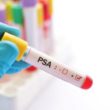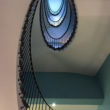A more robust follow-up protocol may be necessary for some men

There is no standard follow-up protocol for men with a negative evaluation with systematic biopsies and multiparametric MRI (mpMRI) and a persistent clinical suspicion of prostate cancer.
This study assessed the proportion of clinically significant prostate cancers during follow-up after negative biopsies and non-suspicious mpMRI and persistent clinical suspicion of prostate cancer compared to the general population.
This prospective study included a subgroup of patients from a multicenter randomized controlled trial conducted between 2014 and 2017 and included 665 men with prior negative systematic biopsies with a persistent elevated PSA and/or suspicious digital rectal examination findings undergoing mpMRI. All patients with negative biopsies and PI-RADS 2 or less on mpMRI entered biochemical follow-up.
In total, 431 patients had non-suspicious mpMRI and entered biochemical follow-up. After a median follow-up of 41 months, 38 patients were diagnosed with prostate cancer; 13 (3%) had clinically significant prostate cancer. A higher risk of a positive biopsy for clinically significant prostate cancer based on the European Randomized Study of Screening for Prostate Cancer (ERSPC)-risk calculator and a suspicious repeat MRI (PI-RADS 3 or higher) were predictive factors for clinically significant prostate cancer.
Following negative prior biopsy and non-suspicious mpMRI, the risk of clinically significant prostate cancer is low. However, compared to the general population, the risk of clinically significant prostate cancer increased despite the high negative predictive value of mpMRI. A more robust follow-up protocol, including regular PSA tests and repeat MRI seems necessary to provide a safety net for men with a persistent suspicion of clinically significant prostate cancer after prior negative biopsy and mpMRi. More research focusing on biochemical and image-guided risk-adapted diagnostic surveillance is warranted.
BJUI 2022, Aug. https://doi.org/10.1111/bju.15876
















